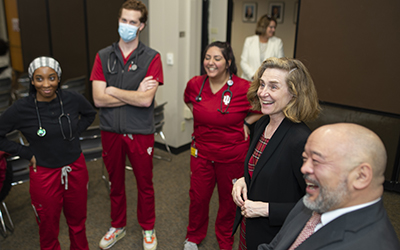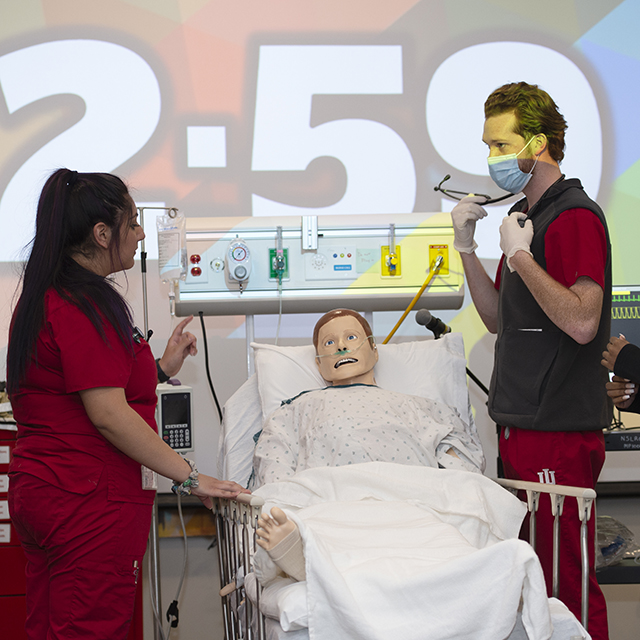Simulation competition prepares future nurses for real-world scenarios
Whether it’s dealing with a common cold or a worldwide pandemic, it’s no understatement to say that nurses are essential to modern society. And at IU Northwest, the School of Nursing does its part to educate and train a new generation of highly skilled nurses.
In fact, average pass rates for graduates of the nursing program on the National Council Licensure Examination are routinely among the highest in the state.
So, what’s the secret to success when it comes to nursing education? Truth be told, it is the result of multiple factors, including giving students the opportunity to encounter real-life experiences through simulation.
In late March, the School of Nursing held “SimWars,” an annual event in which teams of nursing students are thrust into a simulation competition requiring them to use their combined knowledge to treat their patient (a high-tech, human patient simulator).
Jo Newman, clinical assistant professor of nursing, helped organize this year’s competition. “The idea is that students can practice the clinical skills they have learned and apply them to a simulation that mimics a real-world medical scenario,” she said.
In short, SimWars gives students a safe space where they can flex their nursing knowledge without fear of making a mistake. They work in teams (ideally made up of a senior, junior, and sophomore), so students of all levels have the chance to display what they know.
“Seniors and juniors model what they know and have learned. The sophomores find out they know more than they thought they did,” Newman said.
Judy Zar, another clinical assistant professor of nursing, also coordinated this year’s event. She emphasized the teamwork aspect of SimWars. “They (student nurses) put their heads together, communicate with each other, and maybe even delegate to each other,” she said. “Leaders usually end up rising to the occasion.”
Just like any other competition, judges are involved. This year, the judges were clinical assistant professors from the School of Nursing. The judges watched closely as each team worked through the simulation experience, giving points for communication and crisis management skills, safety, evidence-based practice, collaboration, and proficiency of clinical concepts.
The winning team
After an incredible showing from all teams, a winner was crowned. Senior nursing student Luke Crisman was a part of the winning team.

“It’s almost comparable to a sporting event,” Crisman said. “You get really nervous beforehand—you have no idea what to expect. But once you get there, it’s so much fun.”
A senior on his team, Crisman quickly shook off the nerves and got to work. Initially, he planned on being the delegator, helping streamline the simulation for his team members. While he did get a chance to delegate, he said roles shifted once the simulation actually began.
“Nursing is very much a team sport, and sometimes you go in with a plan that gets absolutely shattered.” he said. “You adjust to who has the most experience with the scenario, and we played to our strengths.”
In future years, Crisman hopes there will be many more teams that choose to take on the challenge of SimWars. He said the idea of showcasing your nursing skills in front of an audience can be daunting, but the experience is well worth it.
“It’s only going to help you, and at the end of the day, it’s a lot of fun. Embrace the challenge,” he said.
At its core, SimWars is about educating students and promoting patient safety. However, it’s also a chance to showcase the wonderful work being done at the School of Nursing. The event is always open to all disciplines to watch, and this year, even IU President Pamela Whitten came to view SimWars!
“We are the only nursing program that I know of doing SimWars with a nursing focus,” Newman said. “Other programs have medical students participating—but what can the nurse do independently?”
Judging by the overwhelming success of both SimWars and the nursing program as a whole, it seems that a nurse can do a whole lot independently. With another successful event in the books, the future looks bright for our future nurses.
